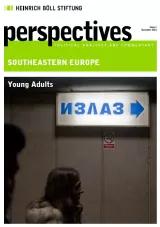Perspectives SEE - Young Adults #1
Introduction
Perspectives Southeastern Europe is about young adults in the Balkans. It is about young people with a specific kind of transition to adulthood. The comparative analysis of some Eastern and Western European countries shows that the age-status transition was strongly standardized under communist modernization, and that the main events of transition to adulthood took place in more predictable ways compared to Western Europe. The standard “socialist” trajectory: completing education – employment – marriage – leaving parents’ household – childbirth: this was a feature of the socialist period in all Balkan countries, too. This trajectory is under constant change. Key life events such as marriage or parenthood are being increasingly postponed. Longer periods of education and internships keep the young people from the labor market, rendering them dependent either on their families or state support. However, the standard life course of young people in the Balkans remains different from life transitions in Western Europe where the biography of young people is much more individualized and less traditional and thus less predictable. One of the main consequences of detraditionalization processes is the fact that structural factors such as class, gender and ethnicity cease to be determinants for individuals in pursuit of “living life of one’s own” – the imperative of modernity. Consequently, life becomes a project; a choice biography replaces the standard one. Life of young people in the Balkans is more traditional. However, due to extraordinary high youth unemployment rates they are stuck in a prolonged adolescence, as well.
Living with their parents, very often up to the age of 35, many of these young people seem to feel comfortable with this tradition. However, a lot of young adults do not. They perceive it as the tradition of patriarchy which they struggle to overcome and get rid of. As opposed to their parents who, willingly or not, had been involved in political structures and networks, many seem to have withdrawn from formal patterns of politics. But the question remains whether this is political capitulation, confusion or resistance in the sense that the young are inventing different, more personal and informal means of pursuing their political interests, e.g. ecological activism, or projects reclaiming the right to the city in an environment of brutal and predatory privatization of public spaces. Or, as a means of taking care of each other, they form smaller communities of LGBT people.
The process of the Balkan countries’ EU accession will alter the life course of this region’s young adults. All those who want change, who want to overcome the tradition of patriarchy and discrimination of LGBT people and who are striving for a more democratic culture with a sense of citizenship and a responsible civil society, who want to get ahead in line with their individual merits rather than their parents’ connections or their party membership, who wish for better choice in a stronger labor market – they can expect support for these endeavors from the transformative power of the EU negotiation and accession process.
Product details
Table of contents
Post-Yugoslav Youth Policies: Reasons for Concern
Serbia: Good Framework, Poor Implementation
by Jovana Tripunović
Croatia: Contours of a European Youth Policy, but Much Remains to be Done
by Marko Kovačić
Youth Activism: Political Sphere as a Channel to Ensure Sustenance rather than Theater for Debate
Serbia: Adapting to the Existing “Rules of the Game”
by Dragan Stanojević
Croatia: Strong Political Cynicism
by Marko Boko
Fear and Anger in Bosnia and Herzegovina
By Nedim Jahić
The Kosovo Youth has yet to be Roused by the Struggle
By Una Hajdari
Youth in Serbia Between Patriarchy and Post-Socialist Transition
By Ivan Đorđević
Being Young and Gay in Serbia: In Search of a Space of Freedom in a Homophobic Society
by Olga Dimitrijević
Keyword: Solidarity
From “Solidarity Meal” to “Bike Kitchen” or How Can One Help the Neediest in One’s Surrounding
By Bojan Cvejić
Solidarity-Based Economy is Returning to Croatia
by Marina Kelava
Citizens of the Earth vs. Land Conquerors – Citizens’ Environmental Movement as a Reaction to the Crisis of Environmental Law and Policy
Environmental Movements and Crisis of Environmental Law and Policy in Serbia
by Mirko Popović and Ivana Savić
Spatial Struggles in Croatia
by Marina Kelava
Battle for Sutjeska River in Bosnia and Herzegovina
By Nataša Crnković
The Right to Culture
by Žarka Radoja and Peđa Popović
